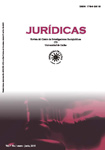Authors
Abstract
One of the substantive contributions made to the social sciences by the sociologist Jürgen Habermas has been the understanding of how individuals process their social and political experience in society from the communicative action. From this perspective, this article reflects about the use they make of the “public sphere” and “deliberative politics” categories, which allows them to politically anchor the communicative action and to give a more substantive and public content to the notion of normative consensus which is central to Habermas’s work. This article points out how the construction of spaces and spheres for deliberation among the citizens has its scope and limitations in certain political contexts and situations.
References
AVRITZER, Leonardo. (2001). “Democracia Deliberativa”. Metapolítica, Vol. 5, pp. 50-65. México.
BAUMAN, Zygmunt. (2003). Modernidad Líquida. Buenos Aires: Fondo de Cultura Económica.
________. (2005). Modernidad y ambivalencia. Barcelona: Anthropos.
BOSTELLS, Bruno. (2001). “Democracia Radical. Tesis sobre la filosofía del radicalismo democrático”. Metapolítica, Vol. 5, pp. 112. México.
CISNEROS SOSA, Armando. (2001). Crítica de los movimientos sociales. Debate sobre la modernidad, la democracia y la igualdad social. México: UAM/Azcapotzalco.
COHEN, Joshua. (2001) “Democracia y Libertad”. En: John Elster (comp.). La democracia deliberativa. Barcelona: Gedisa. pp. 235-288.
COHEN, Jean & ARATO, Andrew. (2002). Sociedad Civil y Teoría Política. México: Fondo de Cultura Económica.
CROSLEY, Nick & ROBERTS, John M. (2004). After Habermas. New perspectives on the Public Sphere. Oxford: Blackwell Publishing.
ELSTER, John. (2001). “Introducción”. En: John Elster (comp.). La democracia deliberativa. Barcelona: Gedisa. pp. 13-33.
FRASER, Nancy. (1992). “Rethinking the Public Sphere: A Contribution to the Critique of Actually Existing Democracy”. In: C. Calhoun (ed.). Habermas and the Public Sphere. Massachusetts: The MIT Press.
________. (1995). “Politics, Culture and the Public Sphere: Toward a Postmodern Conception”. In: L. Nicholson & S. Seidman (eds.). Social Postmodernism: Beyond Identity Politics. Cambridge: Cambridge University Press.
GIDDENS, Anthony. (2004). Las consecuencias de la modernidad. Madrid. Alianza.
HABERMAS, Jürgen. (1962/1981). Historia y Crítica de la opinión pública. Barcelona: Gustavo Gili.
________. (1968/1986). Ciencia y Técnica como “Ideología”. Madrid: Tecnos.
________. (1971/2000). “Introducción a la nueva edición. Algunas dificultades en el intento de mediar teoría y praxis”. En: Jürgen Habermas. Teoría y Praxis. Estudios de filosofía social. Madrid: Tecnos. pp. 14-48.
________. (1973/1986). Problemas de legitimación en el capitalismo tardío. Buenos Aires: Amorrortu.
________. (1981/2005). Teoría de la Acción Comunicativa, I. Racionalidad de la acción y racionalización social. México: Taurus.
________. (1989). El discurso filosófico de la modernidad. Taurus.
________. (1992/1998). Facticidad y Validez: sobre el Derecho y el Estado democrático de Derecho en términos de la teoría del discurso. Madrid: Trotta.
________. (1994/1999). “Tres modelos normativos de democracia”. En: Jürgen Habermas. La inclusión del otro: estudios de teoría política. Barcelona: Paidós. pp. 231-246.
________. (1995/2001). Más allá del Estado Nacional. Madrid: Trotta.
HEIDDEGER, Martín. (1979). Sendas Perdidas. Buenos Aires: Losada.
HORCKHEIMER, Max. (1973). Teoría Crítica. Barcelona: Barral.
LACLAU, Ernesto & MOUFFE, Chantal. (2004). Hegemonía y Estrategia Socialista. Hacia una radicalización de la democracia. Buenos Aires: Fondo de Cultura Económica.
LEFORT, Claude. (1990). La invención democrática. Buenos Aires: Nueva Visión.
LEYVA, Gustavo. (2005). “Pasado y Presente de la Teoría Crítica. Tres vertientes de reflexión para la crítica en el presente”. En: Gustavo Leyva (ed.). La teoría crítica y las tareas actuales de la crítica. México: Universidad Autónoma Metropolitana, Iztapalapa. pp. 84-125.
MARCUSE, Herbert. (1969). El Fin de la utopía. México: Siglo XXI.
McCARTHY, Thomas. (1992). “El discurso práctico: sobre la relación de la moralidad con la Política”. En: Thomas McCarthy. Ideales e Ilusiones. Reconstrucción y Deconstrucción en la teoría crítica contemporánea. Madrid: Tecnos. pp. 193-212.
PRZEWORSKY, Adam. (2001). “Deliberación y dominación ideológica”. En: John Elster (comp.). La democracia deliberativa. Barcelona: Gedisa. pp. 183-206.
RANCIERE, Jacques. (2006). Política, Policía y Democracia. Santiago de Chile: Arces-Lom.
ZIZEK, Slavoj. (2001). El espinoso sujeto. El centro de la ontología política. Buenos Aires: Paidós.

 PDF (Español)
PDF (Español)
 FLIP
FLIP






















